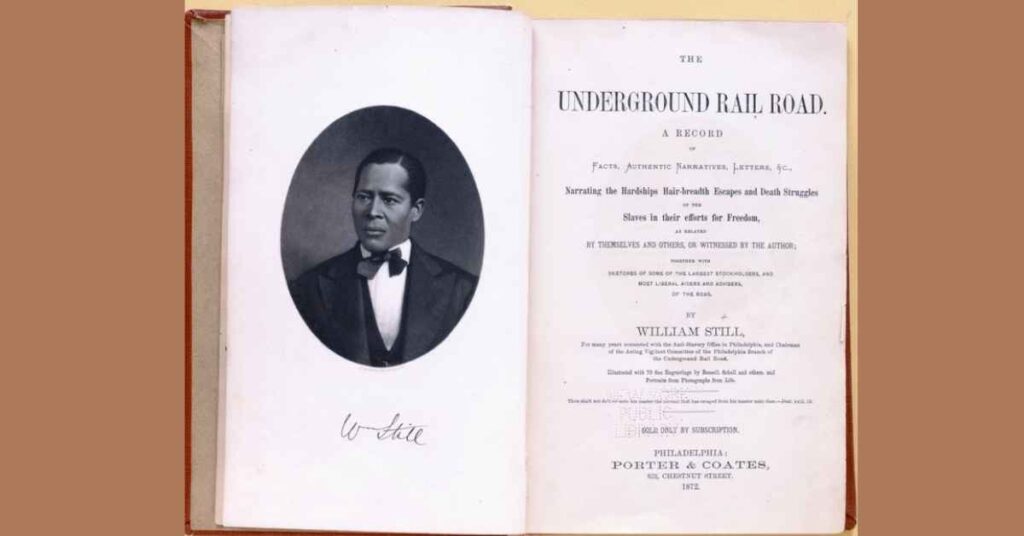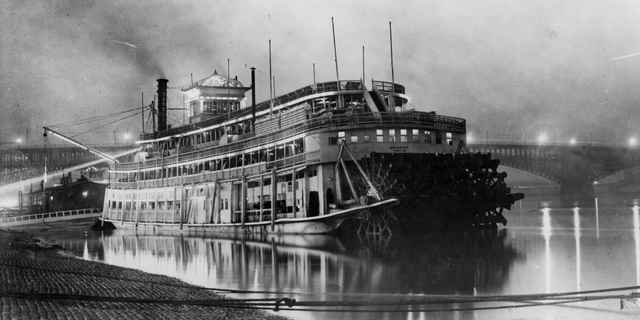This excerpt from “The Underground Railroad” documents the escape of three fugitives on a steamboat. The three men were:
- James Mercer
- Henry Gilliam
- John Clayton
The trio were hidden in a small space near the boiler. It was almost intolerably hot, but they stuck it out and reached Philadelphia.
From there, the local Underground Railroad committee helped them on their way to Canada.
About The Book
“The Underground Railroad” was published in 1872. The book gives the testimonies of hundreds of slaves who escaped to freedom using the network of agents and safe houses.
The author, William Still, was a black abolitionist and businessman who was a key member of the Philadelphia stop in the freedom network.
The book is in the public domain. It can be found in the Library of Congress.

Excerpt – Stowed Away In A Hot Berth
[The headings and text in italics were added by the website editor. The rest is verbatim from the book]
This arrival came by Steamer. But they neither came in State-room nor as Cabin, Steerage, or Deck passengers.
A certain space, not far from the boiler, where the heat and coal dust were almost intolerable, the colored steward on the boat in answer to an appeal from these unhappy bondmen, could point to no other place for concealment but this.
Nor was he at all certain that they could endure the intense heat of that place. It admitted of no other posture than lying flat down, wholly shut out from the light, and nearly in the same predicament in regard to the air.
Here, however, was a chance of throwing off the yoke, even if it cost them their lives. They considered and resolved to try it at all hazards.
Henry Box Brown’s sufferings were nothing, compared to what these men submitted to during the entire journey [follow the link to learn about Henry Box Brown].
Excerpt – Arrival At The Safe House
They reached the house of one of the Committee about three o’clock, A.M.
All the way from the wharf the cold rain poured down in torrents and they got completely drenched, but their hearts were swelling with joy and gladness unutterable.
From the thick coating of coal dust, and the effect of the rain added thereto, all traces of natural appearance were entirely obliterated, and they looked frightful in the extreme. But they had placed their lives in mortal peril for freedom.
Every step of their critical journey was reviewed and commented on, with matchless natural eloquence.
How, when almost on the eve of suffocating in their warm berths, in order to catch a breath of air, they were compelled to crawl, one at a time, to a small aperture; but scarcely would one poor fellow pass three minutes being thus refreshed, ere the others would insist that he should “go back to his hole.”
Air was precious, but for the time being they valued their liberty at still greater price.
After they had talked to their hearts’ content, and after they had been thoroughly cleansed and changed in apparel, their physical appearance could be easily discerned, which made it less a wonder whence such outbursts of eloquence had emanated.
They bore every mark of determined manhood.
The date of this arrival was February 26, 1854, and the following description was then recorded –
Arrived, by Steamer Pennsylvania, James Mercer, William H. Gilliam and John Clayton, from Richmond.

Excerpt About James Mercer
James was owned by the widow, Mrs. T.E. White.
He is thirty-two years of age, of dark complexion, well made, good-looking, reads and writes, is very fluent in speech, and remarkably intelligent.
From a boy, he had been hired out. The last place he had the honor to fill before escaping, was with Messrs. Williams and Brother, wholesale commission merchants.
For his services in this store the widow had been drawing one hundred and twenty-five dollars per annum, clear of all expenses.
He did not complain of bad treatment from his mistress, indeed, he spoke rather favorably of her.
But he could not close his eyes to the fact, that at one time Mrs. White had been in possession of thirty head of slaves, although at the time he was counting the cost of escaping, two only remained – himself and William, (save a little boy) and on himself a mortgage for seven hundred and fifty dollars was then resting.
He could, therefore, with his remarkably quick intellect, calculate about how long it would be before he reached the auction block.
He had a wife but no child. She was owned by Mr. Henry W. Quarles. So out of that Sodom he felt he would have to escape, even at the cost of leaving his wife behind.
Of course he felt hopeful that the way would open by which she could escape at a future time, and so it did, as will appear by and by. His aged mother he had to leave also.
Aftermath
There are several letters from James Mercer in Still’s book when he had reached freedom on Toronto.
James was putting together a plan to ensure his wife could run away from Richmond.
Excerpt – About Henry Gilliam
Wm. Henry Gilliam likewise belonged to the Widow White, and he had been hired to Messrs. White and Brother to drive their bread wagon. William was a baker by trade.
For his services his mistress had received one hundred and thirty-five dollars per year. He thought his mistress quite as good, if not a little better than most slave-holders.
But he had never felt persuaded to believe that she was good enough for him to remain a slave for her support.
Indeed, he had made several unsuccessful attempts before this time to escape from slavery and its horrors. He was fully posted from A to Z, but in his own person he had been smart enough to escape most of the more brutal outrages.
He knew how to read and write, and in readiness of speech and general natural ability was far above the average of slaves.
He was twenty-five years of age, well made, of light complexion, and might be put down as a valuable piece of property.
Aftermath
Henry Gilliam wrote several letters to William Still from St Catherine in Canada. He was concerned about a gentleman called Minkins who had aided in the trio’s escape on the steamer.
Minkins was arrested out of suspicions that he was involved. But Still wrote that he was soon released because no evidence could be found against him.
Excerpt – About John Clayton
John Clayton, the companion in tribulation of William and James, must not be lost sight of any longer.
He was owned by the Widow Clayton, and was white enough to have been nearly related to her, being a mulatto. He was about thirty-five years of age, a man of fine appearance, and quite intelligent.
Several years previous he had made an attempt to escape, but failed. Prior to escaping in this instance, he had been laboring in a tobacco factory at $150 a year. It is needless to say that he did not approve of the “peculiar institution.”
He left a wife and one child behind to mourn after him.
Aftermath
John wrote to William Still from Toronto in 1854. He asked the committee to write to his wife and convey to her that he has arrived safely, and she should not delay in following him from Virginia.
He explains that he will stay at his location until she either arrives or he hears from her.